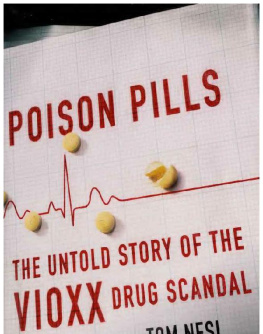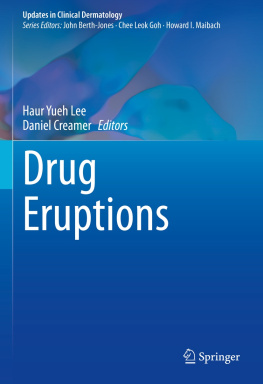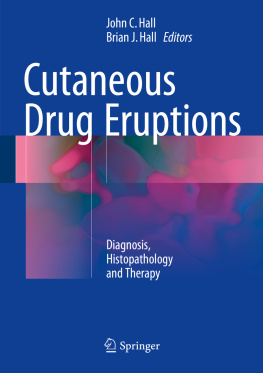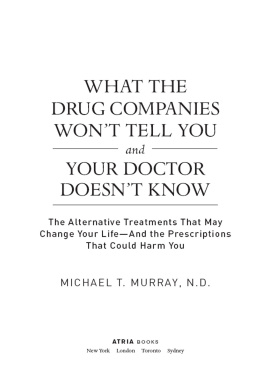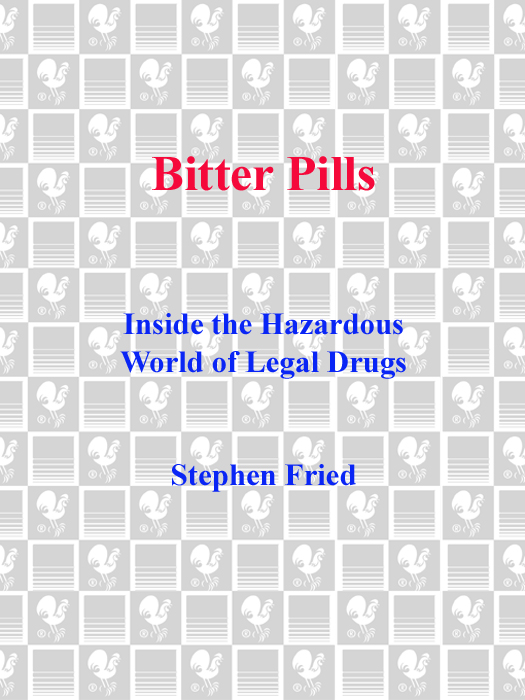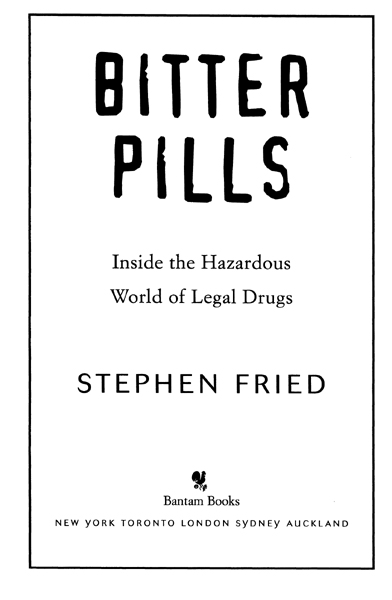ALSO By STEPHEN FRIED
T HING OF B EAUTY
The Tragedy of Supermodel Gia
BITTER PILLS
A Bantam Book
PUBLISHING HISTORY
Bantam hardcover edition / April 1998
Bantam trade paperback edition / May 1999
Certain portions of this book have previously appeared in different form in Philadelphia magazine and The Washington Post Magazine.
All rights reserved.
Copyright 1998 by Stephen Marc Fried.
Afterword and revised appendix copyright 1999 by Stephen Marc Fried.
Library of Congress Catalog Card Number: 97-48457
No part of this book may be reproduced or transmitted in any form or by any means, electronic or mechanical, including photocopying, recording, or by any information storage and retrieval system, without permission in writing from the publisher.
For information address: Bantam Books.
eISBN: 978-0-307-78548-0
Bantam Books are published by Bantam Books, a division of Random House, Inc. Its trademark, consisting of the words Bantam Books and the portrayal of a rooster, is Registered in the U.S. Patent and Trademark Office and in other countries. Marca Registrada. Bantam Books, 1540 Broadway, New York, New York 10036.
v3.1
To my wife,
DIANE AYRES
BITTER PILLS is a work of investigative and personal journalism. Although it raises some frightening questions about legal drugsI know they scare methe book is meant to help reform the system and inform your choices when using medications, not to scare you out of taking them at all.
Suddenly halting the use of a safe drug can be more deadly than taking a so-called dangerous drug. Please do not do it. Read the book, talk to your doctors, and if they dont seem to understand why you want to know more about your own medical care, get new doctors. Get to know your pharmacists and nurses, consider a consultation with a clinical pharmacologist. And when asked what drugs you take, make sure you include all nonprescription medicines. Improperly used, they can kill you, too.
But always remember that we as medical consumers are part of the problem. Drug companies and doctors often make decisions based on the assumption that we are too dumb to understand the medications were given. Dont prove them right.
CONTENTS
Fortunately, a surgeon who uses the wrong side of the scalpel cuts his own fingers and not the patient. If the same applied to drugs, they would have been investigated very carefully a long time ago.
DR. RUDOLPH BUCHHEIM,
the father of pharmacology, 1847
Here was the medicine, the patients died And no one asked: Who thrived? So have we with hellish electuaries In these valleys, these mountains, Raged worse than any plague. I have myself given the poison to thousands. They withered, I must live to see The impudent murderers praised.
FROM FAUST BY
JOHANN WOLFGANG VON GOETHE (1831);
as recited by Widikund Lenzthe German physician who first linked thalidomide to birth defectsat the Kyoto International Conference against Drug-Induced Sufferings, April 1979
PROLOGUE
I t began with a pill. One pill.
My wifes gynecologist gave her samples of a new antibiotic to treat a urinary tract infection so minor, she didnt even know she had it. The doctor told her to take this new wonder drug twice a day for three days.
Your doctor gives you a pill, you take it. When I left for work the next morning, I said good-bye to Diane as she swallowed the first pale yellow oval tablet with breakfast.
Six hours later I was bringing her, delirious, to the emergency room. Our lives havent been the same since.
Diane called me at work several hours after she took that pill and said she felt strange. I knew something was really not right, because my wife comes from a long line of its just a flesh wound stoics who underreact to all physical discomfort. She said she was disoriented and hallucinating. Her mouth was dry, and she felt tingling in her left arm and hand. She was having trouble talking.
After we spoke, she found herself wandering around in her small home office, and when she located her desk, she couldnt figure out how to turn off the computer she writes on every day. When she went to lie down, she started shaking uncontrollably and then saw white. She was sure she was dying.
Then she heard the phone ring. It was me, calling to see if she was feeling any better. Luckily, she was able to reach over, pick up the receiver and mumble to me about what was going on. I called her gynecologist, who told me to take her to the hospital. When the cab got me home from the office, I found Diane lost in her closet. She stammered that she wanted to get dressed to go out but couldnt find her white shirt. I looked down and saw that it was an inch from her hand.
Married people can afford to panic only one at a time, so I pretended I was not scared as I helped her on with the shirt and took her to the hospital closest to where we live in Philadelphia, which happens to be Pennsylvania Hospital, the oldest hospital in America and one of the very best. As Diane spokehaltingly, ellipticallyto the ER doctors, more symptoms emerged. Her jaw was terribly sore from clenching against what we assumed had been a seizure. Her pupils were fixed and dilated, like blobs of black ink. She said she felt as though something were melting just behind her green eyes.
It was late Friday afternoon at the ER, just before the weekend rush, so we got a good, slightly private, curtained-off area. An emergency medicine specialist and several neurology residents tag-teamed in and out of our space. Each one asked a slightly different version of the same questions. I worried that we werent being clear because there didnt seem to be any accumulation of knowledge taking place. They all had tests they wanted Diane to perform.
Spell the word world backwards, one asked. She did it and was then asked to name the U.S. presidents in reverse chronological order.
Can you spell world backwards? the next one asked. Then he requested that she touch her finger to her nose.
Id like you to try to spell the next one began.
yeah, yeah, Diane said, world backwards. But she was bobbing in and out of full lucidity. Only seconds after cracking a joke, her mind would be sluggish again, and she would barely respond when I stroked her cheek or her shoulder-length brown hair.
After nearly five years of marriage, this was the first medical emergency we ever had to face. The only thing that kept me from really losing it was a woman in the next cubicle who already had lost it. Dragged in by the police in the middle of a major psychotic episode, she screamed continually in English and Chinese about everything from her husbands homosexuality to her close personal friendship with the president of the United States. Her screams pierced the crackly trauma calls from ambulances all over the area, which were being broadcast on a loudspeaker system for the ER staff to monitor. The combined noise was oddly stabilizing, a constant reminder that things could be considerably worse.
After several hours of neurological exams, the word came backfrom a place called the Poison Control Centerthat all of Dianes symptoms had been previously reported as reactions to the antibiotic she took. The drug is called Floxin. She had, as we now say, been Floxed.


